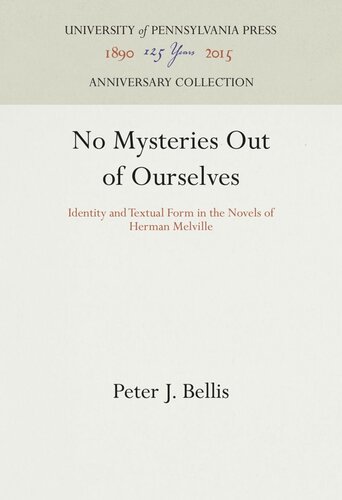

Most ebook files are in PDF format, so you can easily read them using various software such as Foxit Reader or directly on the Google Chrome browser.
Some ebook files are released by publishers in other formats such as .awz, .mobi, .epub, .fb2, etc. You may need to install specific software to read these formats on mobile/PC, such as Calibre.
Please read the tutorial at this link: https://ebookbell.com/faq
We offer FREE conversion to the popular formats you request; however, this may take some time. Therefore, right after payment, please email us, and we will try to provide the service as quickly as possible.
For some exceptional file formats or broken links (if any), please refrain from opening any disputes. Instead, email us first, and we will try to assist within a maximum of 6 hours.
EbookBell Team

5.0
58 reviewsIn this book Peter J. Bellis aims to show how Melville's career is shaped by his desire to define and represent the self, to find a secure identity on which to base personal and social relations. Using Typee, Pierre, White-Jacket, Redburn, Billy Budd, and Moby-Dick as models, Bellis isolates three forms of selfhood—the integrity of the physical body, the son's genealogical link to his father, and the coherence of an autobiographical text—that Melville explores throughout his work. He shows how, as Melville texts each of these, his work becomes increasingly self-reflexive and self-critical; his search for an absolute ground for both self and text ends by undermining the very authority it would establish. In this Melville differed markedly from Whitman and Thoreau, who did find or create identities for themselves in their writing.
Bellis examines Melville's last novel, The Confidence-Man, to show his method as ultimately deconstructive—culminating, in fact, in the abandonment of Melville's own career as a novelist.